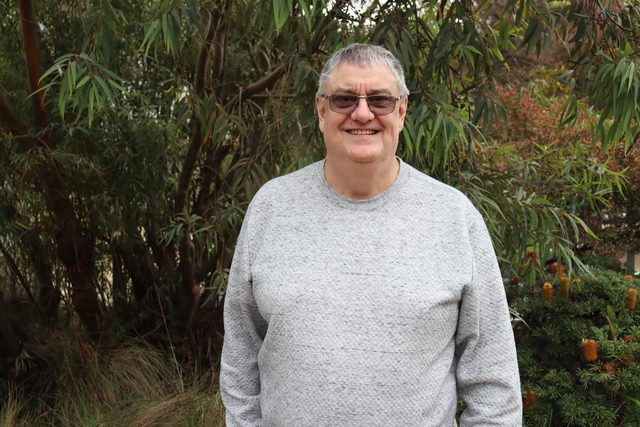
By Mikayla van Loon
For more than two decades prostate cancer has been Australia’s most commonly diagnosed cancer, a figure that continues to rise and now equates to 72 men per day receiving the news.
Ringwood Prostate Cancer Support Group leader Andrew Blackwell said with September being awareness month, the message of early detection is the most important.
“Know where your support group is if you want to join. Get a test. Go and see a urologist, take advice,” he said.
“Don’t sit back and think ‘that’s not going to happen to me’. Be aware of your family history, of your own health, be aware of what’s going on inside you and take care of your mental health.”
As the only support group for the outer eastern suburbs, Mr Blackwell said people travel from all over the Yarra Ranges to find connection and understanding with others who have either received a diagnosis, have recovered from prostate cancer or lost a loved one to the prevalent male illness.
This year alone will see approximately 27,000 men diagnosed with prostate cancer, with nearly 4000 men estimated to die from the cancer in 2024, according to the Australian Institute of Health and Welfare.
While the five-year relative survival rate from 1982 to 2018 improved from 58 per cent to 95.8 per cent, Mr Blackwell said the earlier men are tested the better the outcome is for survival.
Mr Blackwell himself has just received a positive prostate cancer diagnosis after years of monitoring his prostate specific antigen (PSA) levels.
“I am currently on active surveillance but I have just formally been diagnosed with prostate cancer. I had to have a biopsy last week and unfortunately it’s been confirmed. I have to go back to my urologist and we’ll be talking about options,” he said.
“I was originally diagnosed in 2019 and they said ‘there is definitely something there’, they just couldn’t actually definitively say, so it was a wait and see moment. It’s now at the point where cancer cells are present.
“It’s not unexpected. I’ve spent 30 years in the health system, so I basically know what to expect. My older brother has prostate cancer. My dad and three uncles are survivors. My 37-year-old son is already experiencing rising PSAs.”
Before his father was diagnosed, Mr Blackwell said prostate cancer “wasn’t even on my radar” but the results forced him to take the preventative steps of monitoring the health of his prostate in his early 40s by getting a PSA blood test.
“Unless you know your family history you might not know that you could have it. And if you start getting signs and symptoms, it could be too late,” he said.
“It’s one of those cancers where it sits there, it grows and may not cause issues but once you start getting pain, especially in the abdomen and the groin, the treatments have just been made 100 times harder.”
With the recommended age for PSA testing being 50-years-old for men without a family history of prostate cancer and 40-years-old for those with an immediate link to the cancer, Mr Blackwell said this should be used as a guide but the earlier the better.
This is especially true because of the genetic similarities between breast cancer and prostate cancer, attributed to the BRCA1 and BRCA2 genes present in both men and women.
Mr Blackwell said, as an example, should a father have prostate cancer it increases the likelihood of a son also developing the cancer by seven times, while a daughter is four times more likely to have a diagnosis of breast cancer.
From the maternal side, a daughter is 10 times more likely to develop breast cancer if the mother also has it, while a son is four times more likely to receive a prostate cancer diagnosis.
Prostate cancer diagnosis has surpassed breast cancer diagnosis in Australia, something the Prostate Cancer Foundation of Australia (PCFA) cited as a wakeup call.
“The toll prostate cancer takes on the lives of everyday Australians is tremendous,” PCFA chief executive officer Anne Savage said.
“Beyond the high burden of lives lost and the cruel side effects of treatment, prostate cancer costs more than $1.35 billion to treat every year and accounts for more hospitalisations than any other form of cancer.
“We must do more to support early detection and timely treatment with the very latest medicines.”
Mr Blackwell said breaking down the stigma that prostate cancer is “an old man’s disease” was also an essential part of the puzzle.
“That thinking needs to change. Anyone can get it, it’s like any other cancer. It’s just the older we get, the risks increase,” he said.
For those seeking support in the outer east, Mr Blackwell said the Ringwood Prostate Cancer Support Group always welcomes new members.
The group meets at the Maroondah Federation Estate, Room 5, 32 Greenwood Avenue Ringwood on the fourth Tuesday of each month from 7pm.
This month, on 24 September, hear from a Monash University PhD researcher currently looking at radiotherapy for prostate cancer.
More can be found at pcfa.org.au/support/find-a-support-group/ringwood-pcsg/






